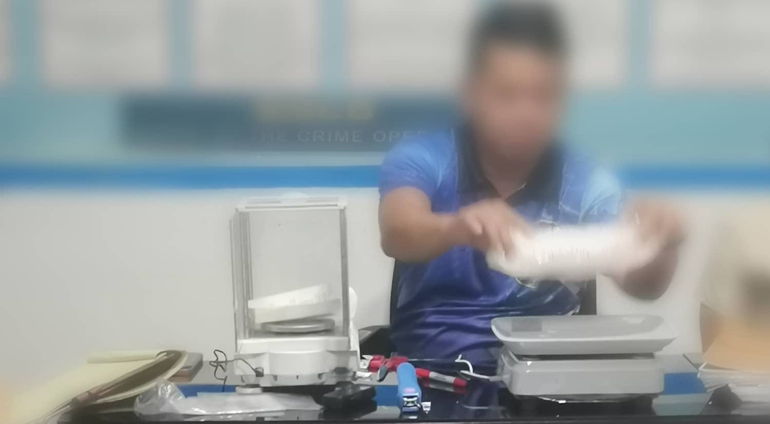NOTE: THIS STORY WAS FIRST PUBLISHED IN THE BOHOL CHRONICLE’S SUNDAY PRINT EDITION.
In compliance with a directive issued by the Regional Trial Court (RTC) Branch 2, the Philippine Drug Enforcement Agency (PDEA) led the conduct of an ocular inspection at the “evidence room” of the Provincial Forensics Unit (PFU) of the BPPO at Camp Dagohoy.
The ocular check conducted on Friday was attended by RTC Branch 2 Presiding Judge Jennifer Chavez-Marcos, a representative from the Department of Justice (DOJ), a lawyer of an accused in an ongoing drug case, a lawyer from the Public Attorney’s Office (PAO), representative from the Prosecution Office, barangay officials, members of the media and policemen who served as arresting officers of an anti-illegal drug operation.
P/Maj. Jovani Abregana, who is the head of the forensics unit and chemist based at BPPO, showed the drug in their custody from which small residues were taken as sample specimen to be presented in court, while bulk of the remaining drug evidence will be subjected to destruction by the PDEA at their Regional Office in Cebu City.
Maj. Abregana explained that all drug specimens confiscated by the anti-illegal drug operating units of drug enforcement teams will be placed in the evidence room of the PFU after this is turned over to them by the arresting officers and once the drug case has been raffled off in court.
The court will issue a directive within 72-hours for the conduct of an ocular inspection of the seized drug items.
The PFU chief made it clear to the ocular team that confiscated drug evidence cannot just be destroyed outright as there are procedures to followed, as prescribed by the law and corresponding circulars. He said the PDEA is the agency tasked by law in the manner of safekeeping and later on the safe destruction of seized drugs.
Maj. Abregana explained that handling of drug evidence is duly recorded, documented and inventoried as to its quantities and even its purity.
“These procedures ensure that no recycling of illegal drugs can occur,” Abregana said.
For the first time, the forensics unit of the Bohol Provincial Police Office (BPPO) opened its depository of seized illegal drugs to dispel allegations that anti-narcotics operatives are recycling drug evidence.
In compliance with a directive issued by the Regional Trial Court (RTC) Branch 2, the Philippine Drug Enforcement Agency (PDEA) led the conduct of an ocular inspection at the “evidence room” of the Provincial Forensics Unit (PFU) of the BPPO at Camp Dagohoy.
The ocular check conducted on Friday was attended by RTC Branch 2 Presiding Judge Jennifer Chavez-Marcos, a representative from the Department of Justice (DOJ), a lawyer of an accused in an ongoing drug case, a lawyer from the Public Attorney’s Office (PAO), representative from the Prosecution Office, barangay officials, members of the media and policemen who served as arresting officers of an anti-illegal drug operation.
P/Maj. Jovani Abregana, who is the head of the forensics unit and chemist based at BPPO, showed the drug in their custody from which small residues were taken as sample specimen to be presented in court, while bulk of the remaining drug evidence will be subjected to destruction by the PDEA at their Regional Office in Cebu City.
Maj. Abregana explained that all drug specimens confiscated by the anti-illegal drug operating units of drug enforcement teams will be placed in the evidence room of the PFU after this is turned over to them by the arresting officers and once the drug case has been raffled off in court.
The court will issue a directive within 72-hours for the conduct of an ocular inspection of the seized drug items.
The PFU chief made it clear to the ocular team that confiscated drug evidence cannot just be destroyed outright as there are procedures to followed, as prescribed by the law and corresponding circulars. He said the PDEA is the agency tasked by law in the manner of safekeeping and later on the safe destruction of seized drugs.
Maj. Abregana explained that handling of drug evidence is duly recorded, documented and inventoried as to its quantities and even its purity.
“These procedures ensure that no recycling of illegal drugs can occur,” Abregana said. (Kit Bagaipo)

